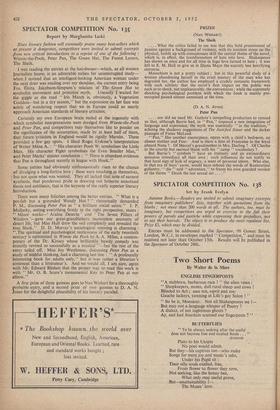SPECTATOR COMPETITION No. 135
Report by Marghanita Laski Since literary fashion will eventually praise many best-sellers which at present it denigrates, competitors were invited to submit excerpts from new critical introductions to a reprint of one of the following : Winnie-the-Pooh, Peter Pan, The Green Hat, The Forest Lovers, The Sheik.
I was reading the entries at the hairdresser—which, as all women journalists know, is an admirable milieu for uninterrupted study— when I noticed that an intelligent-looking American woman under the next drier was reading over my shoulder, the current entry being Fru Greta Jakobson-Simpson's relation of The Green Hat to symbolist movement and primitive myth. Uneasily I waited for the giggle as she read " Iris March is, obviously, a Vegetation Goddess—but in a dry season," but the expression on her face was solely of wondering respect that we in Europe could so nearly approach American standards of literary criticism.
Certainly my own European brain reeled at the ingenuity with which symbolist interpretations were dredged from Winnie-the-Pooh and Peter Pan, and competitors 'may themselves like to ponder on the significance of the assumption, made by at least half of them, that future criticism in England• would be rigidly Marxist. These provided a few gay spots. I liked Roger Erskine's interpretation of Writer Milne A. : " His character Pooh W. symbolises the Little Man. His character' Piglet symbolises the Even Smaller Man," and Peter Marks' sinister conclusion : " There is abundant evidence that Pan is throughout secretly in league with Hook."
Some entries had obviously enthusiastically risen to the chance of divulging a long-furtive love ; these were touching in themselves, but not quite what was wanted. They all lacked that note of earnest synthesis, that ponderous pride in drawing out hitherto unnoticed thesis and antithesis, that is the keynote of the really superior literary Introduction.
There were many felicities among the better entries. " What is a pre-fab but a grounded Wendy Hut ? " rhetorically demanded P. M., discussing Peter Pan as " a brilliant social satire." J. P. Mullarky, setting everything firmly in the right perspective, states : " Minor works—' Arabia Deserta ' and The Seven Pillars of Wisdom '—gave our great-grandfathers incomplete accounts of desert life, but Miss Hull drew the veil completely and revealed the true Sheik." D. D. Murray's sociological opening is charming : ",The spiritual and psychological restlessness of the early twentieth century is epitomised in Winnie the Pooh by A. A. Milne, a contem- porary of the Dr. Kinsey whose brilliantly bawdy comedy was recently revived so successfully as a musical "—but the rest of the entry tailed off. Miss Joy Westhouse, disCussing Peter Pan as a study of wishful thinking, had a charming last line : " A profoundly interesting book for adults only," but it was rather a librarian's comment than a littdrateur's. And we would all, I am sure, agree with Mr. Edward Blishen that the proper way to read this work is with " Mr. 0. B. Scure's monumental Key to Peter Pan at our elbow."
A first prize of three guineas goes to Nan Wishart for a thoroughly probable entry, and a second prize of two guineas to D. A. N. Jones for the delightful plausibility of his literary parallel.
PRIZES (NAN WISHART) The Sheik .. What the critics failed to see was that this bold presentment of passion against a background of violence, with its insistent stress on the physical, builds up with consummate skill the central theme of the novel, which is, in effect, the transformation of hate into love. Shakespeare has shown us once and for all time in Iago love turned to hate ; it was left to E. M. Hull to give us in Diana Mayo the scarcely less horrifying converse.
, Masochism is not a pretty subject ; but in this powerful study of a woman abandoning herself to the cruel mastery of the man who has degraded her, the author has employed a crudely romantic framework with such subtlety that the novel's first impact on the public was such as to shock, not unpleasurably, the conventions ; while the supremely shocking psychological problem with which the book is mainly pre- occupied passed almost unnoticed at the time.
(D. A. N. JONES) Peter Pan
.... nor did we need Mr. Guthrie's compelling production to remind us that, although Barrie had, in " Pan," imposed a new integration of language and experience, the myth was essentially " in the tradition," echoing the shadowy suggestions of The Justified Sinner and the darker passages of Fiona McLeod.
" Pan," like another masterpiece, opens with a child's bedroom, an absent mother and Fear. And is there a hint of Francoise in the loyal absurd Nana ? Of Marcel 's grandmother in Mrs. Darling ? Of Charles in the courtly but maimed Hook with his " camp " vocabulary ?
But Barrie's " symbols " have an intensity and an extraordinary sensuous immediacy all their own ; such influences do not testify to that local sign of lack of urgency, a want of personal idiom. Who else, in that era of boys' yarns, would have echoed the words of Restoration gallantry, " die " and adventure," to frame his own guarded version of the theme " Death the last sexual act ...."


















































 Previous page
Previous page